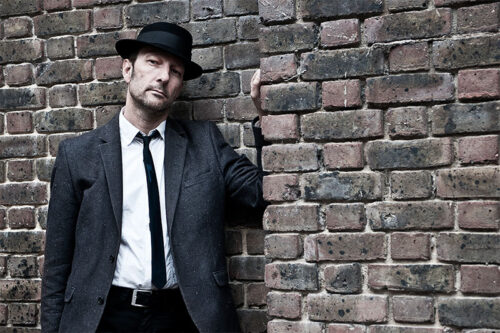Out with album number five, «Rapport frå eit grensehotell»
This record is supposed to be rawer and have more of a rock expression than previously. Why and how?
– Producer Lars Voldsdal and I agreed that this should be a rock album. Most of the songs contained a heaviness that seemed to point towards a rougher musical expression. We use a lot of electric guitar on the record, and my acoustic guitar is often driven through an amp. But rock isn’t foremost about decibel or distorted guitars, it’s just as much about timing and attitude. We had a constant focus on achieving the strongest possible expression, throughout the production. I also think I sing a notch rawer than previously on this album.
After several translations, lectures and book contributions, there are many who associate you with Bob Dylan. Can he be heard on this album?
– Musically, I don’t think Dylan is so present on this record; it rather collects its inspiration elsewhere. What Dylan is a great guiding light for in the studio, is going for expression rather than technical perfection. When rumour has it that Dylan sometimes starts a song in the studio without the musicians knowing the song, it’s not to be mean, but to achieve an certain expression.
Vulnerable characters and relationships fallen apart, you’ve said about the lyrics. And with the title “Report from a Border Hotel” it seems like this is a divorce album…?
– No, myself I’m still happily married, and I don’t think this will be perceived as a divorce album; there’s not a lot of talk of break-ups here. Rather I think the album deals with a deeper form of loneliness. One is just far away from each other, almost like being directed. I believe I’ve noticed on concerts already, that these new, dark songs about loneliness get to people in a different way; I can tell by the way they listen.
The musicians Erland Dahlen, Tor Egil Kreken, Kjetil Steensnæs and David Wallumrød play on almost the entire album. Have you gone for a band feeling?
– Yes, it was important to me to find a band that had a unique and great chemistry, both personally and musically. Actually we all met on that first day of recording, packed up our instrument cases, had a cup of coffee and started the first song. There was a great atmosphere in the studio, both relaxed and focused at the same time. We didn’t waste much time talking, and let the music find its own way. It was a matter of the right songs and the right people and the right place at the right time!
After the previous album you went on tour with Hellbillies, what’s up now?
– This time I start out alone and will get some company as the tour progresses. I begin in Harstad in early February and move south. The last week of February I will do four concerts with the band from the album, in Bergen, Stavanger, Haugesund and Oslo. Looking forward to those!
Where do you listen to music and where do you buy music?
– I listen at home, in the lounge or in the bedroom. And when I’m on tour, mostly to the radio. I’m not a great explorer of new music, and would do alright on a desert island with Bach’s Goldberg Variations with Glenn Gould and some Dylan album. I buy physical albums on Platekompaniet, Big Dipper and Shabby Records.
What’s the future of the album format?
– It may look like the days of the album are numbered, but look what happened to the vinyl. At the same time, now it seems like many consider the format in terms of profit and exposure, but really it would be interesting to take the opportunity to consider what is the music’s own premises.
What will be the next concert you’ll catch.
– Since my album is about longing and absence, I’d rather mention that I really wanted to catch the psychedelic drone band Lumen Drones at Bakarøynå in Haugesund, but I had to leave for Oslo that day. But next time!
Which new artist would you like to give some credit?
– I take the liberty of drawing notice to the rising post-prog band The Glutton, who as far as I know are working on the follow-up to their debut album. Their guitarist is a son of mine.
Olav Østrem, Klassekampen, 26 Jan. 2015
